A Brief Colonial History Of Ceylon(SriLanka)
Sri Lanka: One Island Two Nations
A Brief Colonial History Of Ceylon(SriLanka)
Sri Lanka: One Island Two Nations
(Full Story)
Search This Blog
Back to 500BC.
==========================
Thiranjala Weerasinghe sj.- One Island Two Nations
?????????????????????????????????????????????????Thursday, November 21, 2019
Gotabhaya Rajapaksa: Sri Lanka's controversial ex-defence chief eyes power
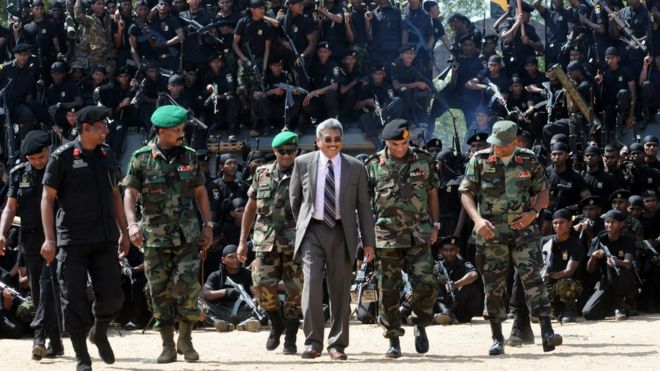
Sri Lanka's former defence secretary, Gotabhaya Rajapaksa (C), pictured in 2010
By Anbarasan Ethirajan-12 August 2019
Sri Lanka's controversial former defence chief, who played a leading
role in crushing Tamil rebels in a bloody civil war which ended 10 years
ago, has been nominated as the opposition's presidential candidate in
the forthcoming election.
Gotabhaya Rajapaksa is loathed by Sri Lanka's minority Tamils but
celebrated as a hero by many in the majority Sinhalese population,
particularly hardliners.
He believes he can capitalise on calls for a strongman to govern the
country rocked by a series of suicide attacks by Islamists on Easter
Sunday which left 253 people dead.
"I will accept responsibility for your safety, and the safety of your
children and your loved ones," Mr Rajapaksa said at the conference of
the Sri Lanka People's Front in Colombo on Sunday.
There is widespread anger against the present government for its
perceived failure in preventing the attacks - and the governing alliance
is yet to name its candidate for the election, which will be held
before 9 December.
Mr Rajapaksa's nomination will disappoint minority Tamils and those who
were victims of rights abuses when he headed the powerful defence
ministry between 2005 and 2015. His brother Mahinda Rajapaksa led the
country as president during this period and cannot run again because of
Sri Lanka's two-term limit.
Several journalists who were critics of the previous government were
abducted, tortured and killed when the Rajapaksas led Sri Lanka.
Thousands of people, particularly Tamils, vanished in what has been
described as enforced disappearances.
But in the immediate aftermath of the Easter Sunday bombings, feelings
were raw. At a funeral for one of the victims, a grief-stricken relative
wailed and shouted: "We need Gota, We need Gota."
- The civil war enemies who fell in love
- Sri Lanka 'war crimes': Main allegations
- Watch: The final days of a civil war
- Finding Father Francis: Sri Lanka's missing thousands
Mr Rajapaksa spoke to the BBC from his home in Colombo in the aftermath
of the attacks. When asked about allegations against him, including war
crimes, he dismissed them all as "baseless" - and vowed that he would be
the one leader who could boost the nation's security.
"I think any country, any government or leaders must be first security
conscious, especially this era when all over the world there are
terrorist incidents are happening," he told me.
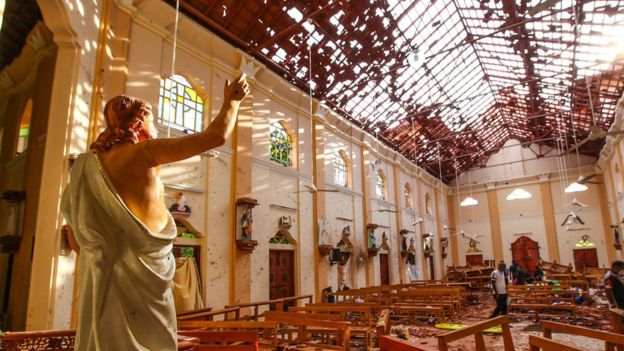
More than 250 people were killed in the Easter bombings
I first met Mr Rajapaksa 10 years ago in Colombo during the final stages
of the civil war. He was known for his volatile temper, and many
journalists were too scared to ask him tough questions, especially
questions about alleged rights abuses committed by Sri Lankan security
forces.
But during our most recent meeting, even before he was officially
nominated as a candidate, Mr Rajapaksa sounded like a different man.
Sitting in his study, surrounded by books, he answered difficult
questions calmly.
He said he was confident of victory, but he had some hurdles to
surmount. His candidacy was also in doubt for months as he held dual
nationality. Although Mr Rajapaksa has said he has renounced his US
citizenship, his opponents are still calling on him to provide evidence
that he has done so.
There also remain serious concerns that under Mr Rajapaksa's presidency
the rights of the religious and ethnic minorities will not be respected.
In his speech on Sunday, Mr Rajapaksa tried to dispel such fears.
"I pledge to create a safe and secure environment in which all Sri
Lankans, irrespective of their race or religion, will be able to live in
peace," he said.
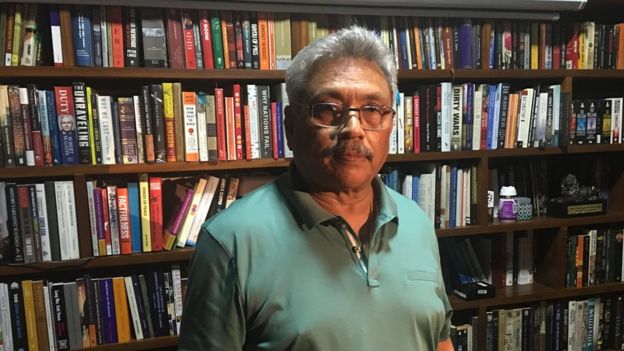
Gotabhaya Rajapaksa is running as a national security candidateImage caption
Another cloud hanging over Mr Rajapaksa relates to cases against him in
US courts. In the first, filed in April, he is accused of ordering the
murder of a newspaper editor, Lasantha Wickrematunge, in Sri Lanka a
decade ago. A second case relates to the alleged torture of a Tamil
detainee during the war.
Wickrematunge was the well-known editor of The Sunday Leader and a vocal
critic of the Rajapaksas. He published a series of reports alleging
corruption in arms deals by then-defence secretary Mr Rajapaksa.
Wickrematunge received death threats for his reports, and wrote an
editorial before his death predicting that the government would kill
him. In January 2009, he was shot and stabbed to death in broad daylight
in Colombo by unidentified men. No-one has been brought to trial for
his murder - and few expect anyone ever will be.
The murder shook the nation, coming just days before the editor was to
give evidence against Mr Rajapaksa. Mr Wickrematunge's daughter, Ahimsa,
is now seeking unspecified damages in the case filed in California. It
accuses Mr Rajapaksa of instigating and authorising her father's murder.
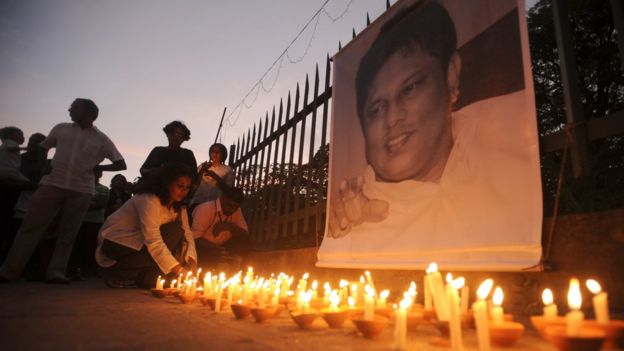
The second case relates to Roy Samathanam, a Tamil civilian with
Canadian citizenship. He was arrested in Sri Lanka before the war ended
over suspected links with the Tamil Tigers. He alleges he was tortured
in custody and forced to sign a confession before he was released in
2010.
The cases were filed in US courts because of Mr Rajapaksa's American
citizenship. "Both cases are baseless because I did not do these
things," he told me. He listed various actions taken during his tenure
to bring Mr Wickrematunge's killers to justice.
Since I interviewed him, the number of cases Mr Rajapaksa is facing has
risen. On 26 June, 10 more plaintiffs filed papers in Californian courts
seeking damages from him. They allege that they were tortured and, in
some cases, raped and sexually assaulted by security forces under his
command.
All the allegations against him are "politically motivated", Mr
Rajapaksa said. "I have been visiting the US for so many years, Why [are
they raising it] at this time?"
Even if he has indeed denounced citizenship, the cases could still proceed.
- The man who might have stopped the bombings
- The family networks behind the bombings
- Children of the Easter Sunday carnage
The Easter Sunday bombings happened just a month before the country
observed the 10th anniversary of the end of the war with the Tamil
Tigers. The conflict lasted almost three decades and it is estimated at
least 100,000 people were killed. The UN and other agencies estimate
that at least 40,000 people were killed in the last stages when the Sri
Lankan military launched its final assault.
Tens of thousands of civilians, and the rebels themselves, were
eventually trapped in a small sliver of coastal land in the north-east.
The military pounded the area with artillery while the rebels also shot
civilians trying to escape. A UN official in Colombo at the time said
their warnings of a bloodbath had become a reality.
The Tamil Tigers were eventually routed and thousands surrendered to the
Sri Lankan army. But hundreds of families of rebels who surrendered say
they have still not heard from them.
Detailed
video footage and eyewitness accounts emerged after the war showing
what are alleged to be widescale extra-judicial killings of Tamils by the military in the final stages of the conflict.
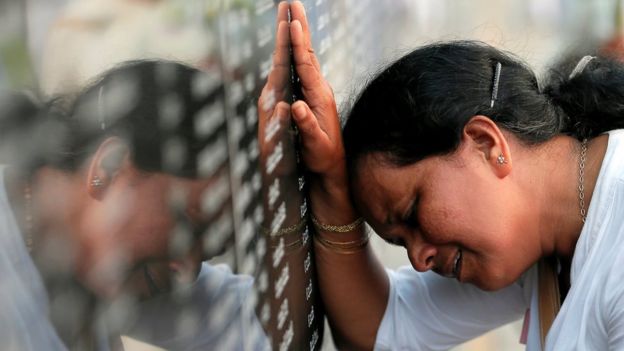
Based on that evidence, the UN and other rights groups have called on
the Sri Lankan government to establish a war crimes tribunal to
investigate the allegations of crimes against humanity, both by the
military and the Tamil militants.
Successive Sri Lankan governments have resisted attempts to establish an
international inquiry, saying it is a domestic issue and the
allegations should be looked into internally. But virtually nothing been
done to pursue justice after the war.
During a visit to northern Sri Lanka last year, I met a group of Tamil
women and men protesting in the Tamil-dominated town of Kilinochchi.
They were demanding to know the whereabouts of their sons, brothers, and
daughters who had surrendered to the military.
Mr Rajapaksa vehemently denied that those who surrendered were killed in
cold blood. "No I don't believe that," he told me. "Anybody who
surrendered to the army was registered. Everything happened in a rush,
everything happened in a chaotic situation," he said.
He said that about 13,000 Tamil rebels who were either captured or
surrendered had been rehabilitated since the end of the war. He
dismissed suggestions that some Tamil Tigers were being kept in secret
prisons.
"No we did not run any secret prisons. It is not easy in this country to have secret places," he said.
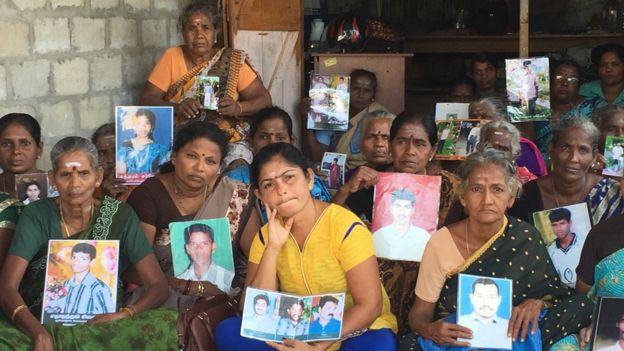
His many critics would disagree. After the war, army camps were out of
bounds to journalists, human rights officials, and relatives of the
missing. There is still no independent confirmation of what happened to
those who disappeared.
Minority Tamils and rights activists rejoiced when Mahinda Rajapaksa
unexpectedly lost the election in 2015. They hoped that normal life
would resume in the country and freedom of speech and media rights would
be protected.
There has been peace in the years since the war ended, allowing some of
scars to begin to heal. But the Easter bombings shattered that process -
the attacks, along with a recent political crisis, have changed
people's opinions.
Many Sri Lankans now say they are disappointed with government
infighting and a blame game over the bombings between the current
president, Maithripala Sirisena, and the prime minister, Ranil
Wickremesinghe. In Sri Lanka, and around the world, people were shocked
by the image of bungling incompetency the government projected.
That goes some way to explaining why many Sri Lankans are calling for a
strong leader at a time of national crisis. Mr Rajapaksa believes he is
the right man for the job.
Although human rights activists warn that the desire for a strong leader
should not supersede civil liberties and media freedom, he is widely
seen as the frontrunner. Gotabhaya Rajapaksa will be a hard man to beat.

